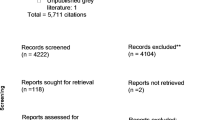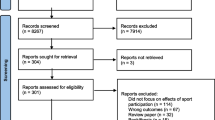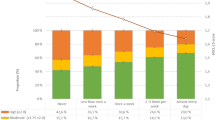Abstract
The last ten years in Canada have seen a degree of merger between community mental health services and efforts to end homelessness, in part through the growth of a Housing First model in the homelessness sector. As efforts are made to move individuals experiencing homelessness into permanent housing, one component being explored is how to anchor people into communities while they manage ongoing mental health concerns. Sport has been identified as one potential modality of building social inclusion. In this paper, a mixed methods evaluation is presented on a program intended to increase social inclusion through sports geared towards those living with mental health challenges and/or experiencing homelessness. Results showed that the program was a ‘Refuge’ for people with complex and challenging lives, that participants found a sense of ‘Fellowship’, and discovered ‘New Energy’. It is concluded that community sports programs might offer a promising intervention to move community integration from aspiration to reality.


Similar content being viewed by others
References
Aubry T, Nelson G, Tsemberis S. Housing first for people with severe mental illness who are homeless: a review of the research and findings from the at home—chez soi demonstration project. The Canadian Journal of Psychiatry. 2015;60(11):467–74. https://doi.org/10.1177/070674371506001102.
Benkwitz A, Healy LC. “Think Football”: Exploring a football for mental health initiative delivered in the community through the lens of personal and social recovery. Ment Health Phys Act. 2019;17: 100292. https://doi.org/10.1016/j.mhpa.2019.100292.
Braun V, Clarke V. Using thematic analysis in psychology. Qual Res Psychol. 2006;3(2):77–101.
Burchardt T, Le Grand J, Piachaud D. Social exclusion in Britain 1991–1995. Social Policy Administ. 1999;33(3):227–44.
Callaghan P. Exercise: a neglected intervention in mental health care? J Psychiatr Ment Health Nurs. 2004;11(4):476–83. https://doi.org/10.1111/j.1365-2850.2004.00751.x.
Collins MF, Kay T. Sport and Social Exclusion. London: Routledge; 2003.
Cresswell JW, Plano Clark VL. Designing and conducting mixed method research. Thousand Oaks, CA: Sage; 2007.
Curran K, Drust B, Murphy R, Pringle A, Richardson D. The challenge and impact of engaging hardto- reach populations in regular physical activity and health behaviours: an examination of an English Premier League ‘Football in the Community’men's health programme. Public Health 2016;135:14–22.
Davey S, Gordon S. Definitions of social inclusion and social exclusion: the invisibility of mental illness and the social conditions of participation. Int J Cult Ment Health. 2017;10(3):229–37.
Edwards MB. The role of sport in community capacity building: an examination of sport for development research and practice. Sport Manag Rev. 2015;18(1):6–19.
Hamilton A, Foster C, Richards J. A systematic review of the mental health impacts of sport and physical activity programmes for adolescents in post-conflict settings. J Sport Develop. 2016;4(6):44–59.
Huxley P, Evans S, Madge S, Webber M, Burchardt T, McDaid D, Knapp M. Development of a social inclusion index to capture subjective and objective life domains (Phase II): psychometric development study. Health Technol Assess. 2012. https://doi.org/10.3310/hta16010.
Johns A, Grossman M, McDonald K. “More than a game”: The impact of sport-based youth mentoring schemes on developing resilience toward violent extremism. Social Inclusion. 2014;2(2):57–70.
Kelly L. ‘Social inclusion’ through sports-based interventions? Crit Soc Policy. 2011;31(1):126–50.
Lee Williams P, Lloyd C, King R, Paterson M. Street Soccer programme participation: experiences of young people with psychosis. Int J Ther Rehabil. 2013;20(12):606–11.
McClelland C, Giles AR. Health matters: The social impacts of street-involved youth’s participation in a structured leisure programme. Leis Stud. 2016;35(1):46–63. https://doi.org/10.1080/02614367.2014.994549.
Mouloud K, Elkader BA. Sport and mental health level among university students. Phys Education Students. 2016;3:39–42. https://doi.org/10.15561/20755279.2016.0305.
Ogundipe E, Borg M, Thompson T, Knutsen T, Johansen C, Karlsson B. Recovery on the Pitch: street football as a means of social inclusion. J Psychosoc Rehabil Mental Health. 2020;7(3):231–42. https://doi.org/10.1007/s40737-020-00185-6.
Oudshoorn A, Smith-Carrier T, Hall J, Forchuk C, Befus D, Caxaj S, Ndayisenga JP, Parsons C. Understanding the principle of consumer choice in delivering housing first. Hous Stud (2021). https://doi.org/10.1080/02673037.2021.1912713.
Rasciute S, Downward P. Health or happiness? What is the impact of physical activity on the individual? Kyklos. 2010;63(2):256–70.
Rich KA, Misener L, Dubeau D. ‘Community Cup, We Are a Big Family’: examining social inclusion and acculturation of newcomers to Canada through a participatory sport event. Social Inclusion. 2015;3(3):129–41.
Scherer J, Koch J, Holt NL. The uses of an inner-city sport-for-development program: dispatches from the (real) creative class. Sociol Sport J. 2016;33(3):185–98.
Schulenkorf N, Sherry E, Rowe K. Sport for development: an integrated literature review. J Sport Manag. 2016;30(1):22–39.
Schutt RK, Goldfinger SM. Homelessness, housing, and mental illness. Harvard University Press; 2011.
Sherry E. (Re)engaging marginalized groups through sport: the homeless world cup. Int Rev Sociol Sport. 2010;45(1):59–71. https://doi.org/10.1177/1012690209356988.
Sherry E, Strybosch V. A kick in the right direction: longitudinal outcomes of the Australian Community street soccer program. Soccer and Society. 2012;13(4):495–509.
Sherry E, Karg A, O’May F. Social capital and sport events: spectator attitudinal change and the homeless world cup. Sport Soc. 2011;14(1):111–25. https://doi.org/10.1080/17430437.2011.530015.
Sin R, Chung Yan M. Margins as centres: A theory of social inclusion in antioppressive social work. In: Shera Wes, editor. Emerging perspectives on anti-oppressive practice. UK: Canadian Scholars Press; 2003.
Spaaij R. Sport as a vehicle for social mobility and regulation of disadvantaged urban youth: lessons from Rotterdam. Int Rev Sociol Sport. 2009;44(2–3):247–64.
Spaaij R. Beyond the playing field: Experiences of sport, social capital, and integration among Somalis in Australia. Ethn Racial Stud. 2012;35(9):1519–38.
Vandermeerschen H, Van Poppel M, Scheerder J. Facilitating access to sports for people in poverty? A study on local social sports policy. J Social Int: Theory Pract. 2016;25(2):4–22. https://doi.org/10.18352/jsi.448.
Vandermeerschen H, Meganck J, Seghers J, Vos S, Scheerder J. Sports, Poverty and the Role of the voluntary sector. Exploring and explaining nonprofit sports clubs’ efforts to facilitate participation of socially disadvantaged people. VOLUNTAS Int J Volunt Nonprofit Organiz. 2017;28(1):307–34.
Vandermeerschen H, Van Regenmortel T, Scheerder J. ‘There are Alternatives, but Your Social Life is Curtailed’: poverty and sports participation from an insider perspective. Soc Indic Res. 2017b;133(1):119–38.
Walseth K. Sport and belonging. Int Rev Sociol Sport. 2006;41(3–4):447–64.
Welty Peachey J, Cohen A, Borland J, Lyras A. Building social capital: examining the impact of Street Soccer USA on its volunteers. Int Rev Sociol Sport. 2013;48(1):20–37.
Wilcock R, Smith A, Haycock D. Designing community sports-based programmes for men with mental illness: a qualitative study of the Offload rugby league programme. Ment Health Phys Act. 2021;20: 100386. https://doi.org/10.1016/j.mhpa.2021.100386.
Funding
Funding for this evaluation was provided through the Ontario Sport and Recreation Community Fund grant.
Author information
Authors and Affiliations
Contributions
AO was the project PI and supported all aspects from development through KT. LM as co-investigator provided intellectual guidance particularly around sport and inclusion, including co-authorship. JR as the project Research Assistant collected the bulk of the data and supported analysis and writing. AVB as Research Coordinator supported literature review and integration, as well as writing.
Corresponding author
Ethics declarations
Conflict of Interest
The authors have no relevant financial or non-financial interests to disclose.
Ethical Approval
This study was approved by Western University’s Research Ethics Board – protocol #108466. Written, informed consent was obtained from all participants. The human participants provided informed consent for direct quotes to be used in the research dissemination.
Additional information
Publisher's Note
Springer Nature remains neutral with regard to jurisdictional claims in published maps and institutional affiliations.
Appendix 1: Interview Guide – Active For Life Evaluation
Appendix 1: Interview Guide – Active For Life Evaluation
-
1.
Which activities of the Active For Life program are you involved in?
-
2.
How did you get involved with these activities?
-
3.
Why did you choose these activities?
-
4.
Have you had any trouble accessing these activities?
-
5.
Have you seen any changes to your physical health that you would attribute to these activities?
-
6.
Have you seen any changes to your mental health that you would attribute to these activities?
-
7.
Have the activities made you feel any more or less connected?
-
8.
Have you met any new people through these activities?
-
9.
Do you connect with any fellow athletes from the Active For Life activities outside of the program?
-
10.
Has participation in these activities taught you anything about being active?
-
11.
Has participation in these activities led you to participate in anything else?
-
12.
Are you considering remaining involved in Active For Life?
-
13.
Are you considering becoming involved in other recreational activities?
-
14.
What kind of recreational activities would you prefer to be involved with in the future?
-
15.
If you could change something about Active For Life, what would it be?
Rights and permissions
Springer Nature or its licensor holds exclusive rights to this article under a publishing agreement with the author(s) or other rightsholder(s); author self-archiving of the accepted manuscript version of this article is solely governed by the terms of such publishing agreement and applicable law.
About this article
Cite this article
Oudshoorn, A., Misener, L., Richards, J. et al. Support Provided Through Sport: An Evaluation of an Intervention for People Experiencing Homelessness. J. Psychosoc. Rehabil. Ment. Health 10, 167–177 (2023). https://doi.org/10.1007/s40737-022-00300-9
Received:
Accepted:
Published:
Issue Date:
DOI: https://doi.org/10.1007/s40737-022-00300-9




